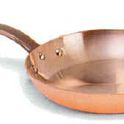When a recipe calls for grated parmesan cheese does that mean to use the Kraft parmesan or should I use fresh grated parmesan
14 Comments
aobenourOctober 19, 2013
Jo could I add one more bit of advice? The good stuff - authentic parmigiano reggiano or grana padano - is expensive. I am on a tight food budget, and in order to afford the good stuff, I buy it at a grocery that is willing to cut me as small a piece as I want, I store it carefully, and I use it sparingly. I also try to find pieces with the smallest rind possible (the rind is good to simmer in soup, but I still try to minimize it). The flavor is strong - you only need a little. It really is work spending extra to get good cheese.
GIOVANNI50October 11, 2013
Only parmiggiano will do. The parmesan is a dried up unsavory version that uses xantham gum for texture. Go figure.
bigpanOctober 11, 2013
Cheese of any kind does not come in a shaker box or in thin sheets wrapped in plastic, or in a jar. Do yourself and guests a favor and toss it out and buy some cheese from a deli.
Johnnie_DOctober 10, 2013
The stuff in the green Kraft can is not cheese...shudder!!!
ChefJuneOctober 7, 2013
The Italians don't get any more ticked off than the French do about Champagne. And Korbel and the others who have used the term so loosely have all been given permission to continue doing so. Would that they'd change of their own accord, but.....
pierinoOctober 7, 2013
ChefJune, you are correct in that the term "Parmesan" has been used for decades. But here's where the Italians get ticked off, it does refer to Parma style. I know grana doesn't have much marketing appeal. Apparently EVOO does, even though under RR's definiton of the term it bears no resemblance to the real thing. And in fact her lable doesn't even qualify as pure olive oil, let alone extra virgin. Don't get me started on balsamic. Thank you for your patience.
ChefJuneOctober 7, 2013
Wisconsin Parmesans are not called Parmiggiano. But they are made in similar style. "Parmesan" is not an Italian term, and it's not likely they're going to change up and call Wisconsin or California Parmesans Grana. The "P" name has been used for decades.
Valentina S.October 7, 2013
Yes June, 'Parmigiano' - the real thing, can only be called that if it is produced in the Parma and Reggio area, with milk from cows raised in a certain way, that ate specific foods. Even in Italy, one could not make Parmigiano in Puglia and call it that, because of the laws around the product.
That said...Pierino: I read on the official Parmigiano website that it should be stored in cling film. If you find that storing it in paper is better, I'll take your advice!
That said...Pierino: I read on the official Parmigiano website that it should be stored in cling film. If you find that storing it in paper is better, I'll take your advice!
ChefJuneOctober 7, 2013
Pierino, I beg to differ. There is some very good Parmesan cheese made in Wisconsin. I believe the company name is Sarvecchio. Granted, there is some mediocre stuff still coming down from there, but Wisconsin cheeses, across the board, are NOT the cheeses of my childhood.
pierinoOctober 7, 2013
Chef June, this is just a technicality really but the "parmesan" cheeses of Wisconsin have never seen the bright lights of Parma. The proper term should be "grana". This is how similar cheeses from outside the DOP area are described in Italy, as in "grana padano". Italy has made some strong objections with the World Trade Organization to the use of the description "parmesan" here. As to Wisconsin, well California now surpasses that state in terms of cheese production.
Lisa P.June 23, 2020
Grana (and it’s complete name, Grana Padana) is designated PDO which is protected by origin. It is made North of the Po River, unlike Parmigiana Regiana, which is South of the Po. Having lived North, I, of course, find Grana superior ;)
pierinoOctober 7, 2013
Parmigiano technically speaking is a D.O.C. (Denominazione d'origine, controllata") product of a particular region, in this case Parma. "Parmesan" is a weasle word used to describe a cheese made in that style, typically badly like Kraft. Wisconsin makes some fine cheeses. Parmesan is not one of them.
The real thing should be wrapped in paper rather than cling wrap for storage.
The real thing should be wrapped in paper rather than cling wrap for storage.
Valentina S.October 7, 2013
If any grated Parmesan can stay fresh for more than a day, then it is very likely not Parmesan at all (and Kraft sure isn't). Always get the whole piece and grate it when you need it. You can store it in the fridge in a glass/plastic container, or wrap it in some plastic film.
Kristen M.October 7, 2013
I would always go with freshly grated parmesan (and that's likely what the recipe author meant). What are you making?
Showing 14 out of 14 Comments
Recommended by Food52
Popular on Food52
Continue After Advertisement






